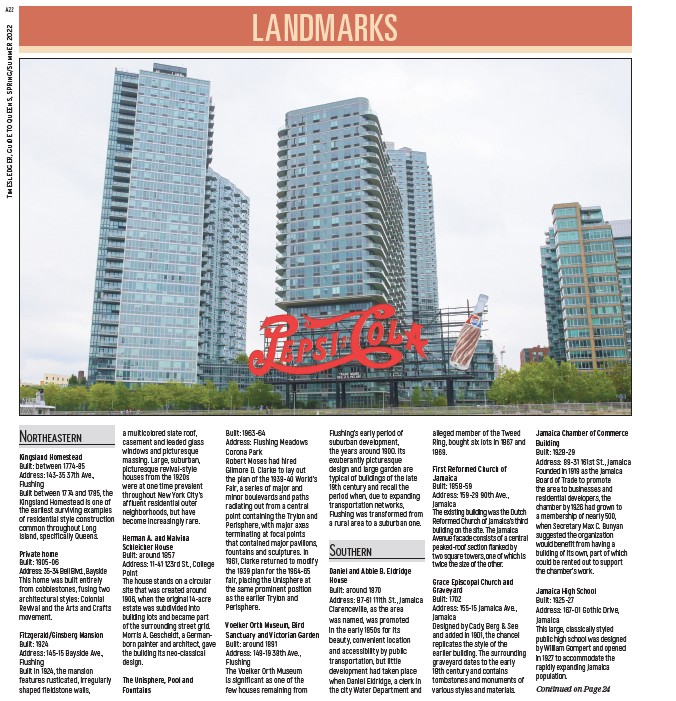
A22
TIMESLEDGER, GUIDE TO QUEENS, SPRING/SUMMER 2022
Northeastern
Kingsland Homestead
Built: between 1774-85
Address: 143-35 37th Ave.,
Flushing
Built between 1774 and 1785, the
Kingsland Homestead is one of
the earliest surviving examples
of residential style construction
common throughout Long
Island, specifically Queens.
Private home
Built: 1905-06
Address: 35-34 Bell Blvd., Bayside
This home was built entirely
from cobblestones, fusing two
architectural styles: Colonial
Revival and the Arts and Crafts
movement.
Fitzgerald/Ginsberg Mansion
Built: 1924
Address: 145-15 Bayside Ave.,
Flushing
Built in 1924, the mansion
features rusticated, irregularly
shaped fieldstone walls,
a multicolored slate roof,
casement and leaded glass
windows and picturesque
massing. Large, suburban,
picturesque revival-style
houses from the 1920s
were at one time prevalent
throughout New York City’s
affluent residential outer
neighborhoods, but have
become increasingly rare.
Herman A. and Malvina
Schleicher House
Built: around 1857
Address: 11-41 123rd St., College
Point
The house stands on a circular
site that was created around
1906, when the original 14-acre
estate was subdivided into
building lots and became part
of the surrounding street grid.
Morris A. Gescheidt, a Germanborn
painter and architect, gave
the building its neo-classical
design.
The Unisphere, Pool and
Fountains
Built: 1963-64
Address: Flushing Meadows
Corona Park
Robert Moses had hired
Gilmore D. Clarke to lay out
the plan of the 1939-40 World’s
Fair, a series of major and
minor boulevards and paths
radiating out from a central
point containing the Trylon and
Perisphere, with major axes
terminating at focal points
that contained major pavilions,
fountains and sculptures. In
1961, Clarke returned to modify
the 1939 plan for the 1964-65
fair, placing the Unisphere at
the same prominent position
as the earlier Trylon and
Perisphere.
Voelker Orth Museum, Bird
Sanctuary and Victorian Garden
Built: around 1891
Address: 149-19 38th Ave.,
Flushing
The Voelker Orth Museum
is significant as one of the
few houses remaining from
Flushing’s early period of
suburban development,
the years around 1900. Its
exuberantly picturesque
design and large garden are
typical of buildings of the late
19th century and recall the
period when, due to expanding
transportation networks,
Flushing was transformed from
a rural area to a suburban one.
Southern
Daniel and Abbie B. Eldridge
House
Built: around 1870
Address: 87-61 111th St., Jamaica
Clarenceville, as the area
was named, was promoted
in the early 1850s for its
beauty, convenient location
and accessibility by public
transportation, but little
development had taken place
when Daniel Eldridge, a clerk in
the city Water Department and
alleged member of the Tweed
Ring, bought six lots in 1867 and
1869.
First Reformed Church of
Jamaica
Built: 1858-59
Address: 159-29 90th Ave.,
Jamaica
The existing building was the Dutch
Reformed Church of Jamaica’s third
building on the site. The Jamaica
Avenue facade consists of a central
peaked-roof section flanked by
two square towers, one of which is
twice the size of the other.
Grace Episcopal Church and
Graveyard
Built: 1702
Address: 155-15 Jamaica Ave.,
Jamaica
Designed by Cady, Berg & See
and added in 1901, the chancel
replicates the style of the
earlier building. The surrounding
graveyard dates to the early
18th century and contains
tombstones and monuments of
various styles and materials.
Jamaica Chamber of Commerce
Building
Built: 1928-29
Address: 89-31 161st St., Jamaica
Founded in 1919 as the Jamaica
Board of Trade to promote
the area to businesses and
residential developers, the
chamber by 1926 had grown to
a membership of nearly 500,
when Secretary Max C. Bunyan
suggested the organization
would benefit from having a
building of its own, part of which
could be rented out to support
the chamber’s work.
Jamaica High School
Built: 1925-27
Address: 167-01 Gothic Drive,
Jamaica
This large, classically styled
public high school was designed
by William Gompert and opened
in 1927 to accommodate the
rapidly expanding Jamaica
population.
LANDMARKS
Continued on Page 24